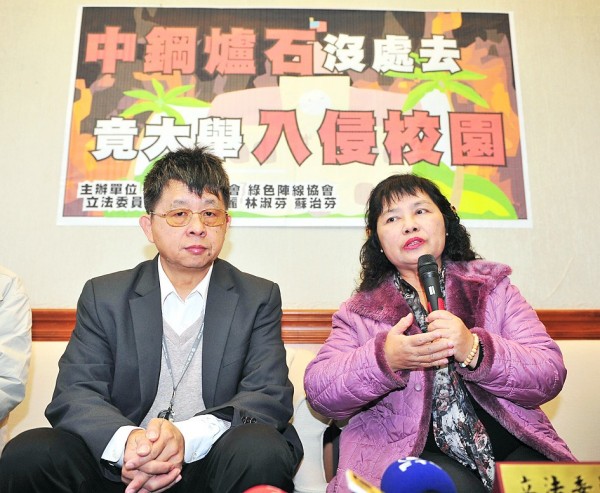《TAIPEI TIMES 焦點》Groups decry dumping of slag at university site

Democratic Progressive Party legislators Wu Kun-yuh, left, and Chen Man-li yesterday speak at a press conference in Taipei on slag dumping on the National Cheng Kung University campus in Tainan. Photo: Wang Yi-sung, Taipei Times
PRODUCT OR WASTE? One environmentalist said that illegal dumping of slag would continue because of its designation as a product, despite having no market
By Chen Wei-han / Staff reporter
Legislators and environmental campaigners yesterday said they exposed a slag dumping operation on a National Cheng Kung University campus in Tainan by a subsidiary of China Steel Corp, which they said was done under the guise of an environmental experiment.
Herlin Hsieh (謝和霖), secretary-general of the Taiwan Watch Institute, said that the company dumped an estimated 200,000 tonnes of basic oxygen furnace (BOF) slag it produced, covering an area of more than 3 hectares on one of the university’s campuses in Tainan’s Annan District (安南).
The dumping was carried out under a contract between the company and the university, in which part of the campus was used as an experiment site to test the environmental compatibility of BOF slag, which Hsieh said was a dumping operation in disguise.
“Was it necessary to use a 3-hectare area to test the slag’s environmental compatibility? A 2,000m2 area would have been enough. Three hectares is about the size of a small landfill. How much did China Steel pay the university to dump the slag?” Green Formosa Front director Lin Chang-mao (林長茂) said.
As slag cannot be used to fill farmland, the company circumvented the law and dumped slag on the campus, Democratic Progressive Party Legislator Wu Kun-yuh (吳焜裕) said.
The university said the experiment was carefully planned, adding that it built 30cm-thick concrete walls coated with asphalt and covered with waterproof cloth to separate slag from soil and groundwater, while the company promised to remove the slag and conduct a cleanup should pollution occur.
“Slag is a highly alkaline material and it swells when exposed to water, so it cannot be used as a building material or deposited anywhere near water,” Hsieh said, adding that the campus is surrounded by fishing farms.
Illegal dumping of BOF and electric arc furnace slag, industrial waste that can be reprocessed into other products, has become rampant, because they are defined as products instead of industrial waste and therefore not subject to the Waste Disposal Act (廢棄物清理法) or the Ministry of Economic Affairs’ regulations on reusable waste, meaning there is no control over the flow of the material, Hsieh said.
“However, the product cannot be sold and steelmakers have tried every way to get rid of slag, even paying reprocessors to dispose of it. What kind of product is that, but waste?” he said.
Wu said that slag, despite being a product, has no market and is often illegally disposed of, adding that slag would continue to be unregulated if it continues to be recognized as a product.
The Industrial Development Bureau said BOF slag and treated slag are not included in the bureau’s management system, but it said it would revise the system in three months.
新聞來源:TAIPEI TIMES




















